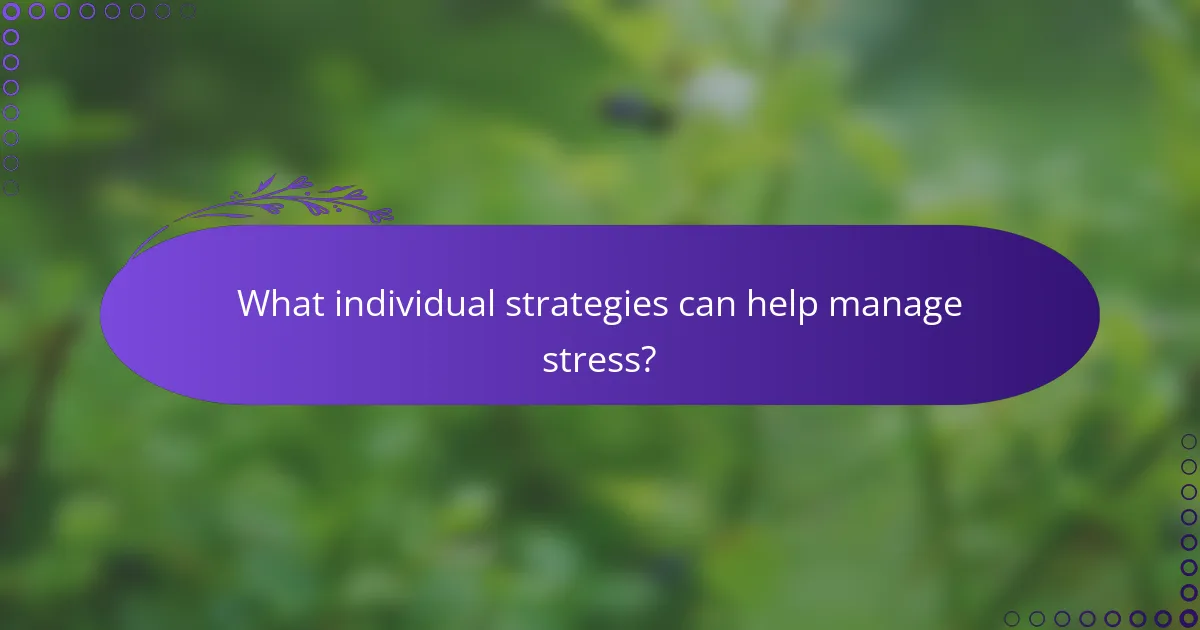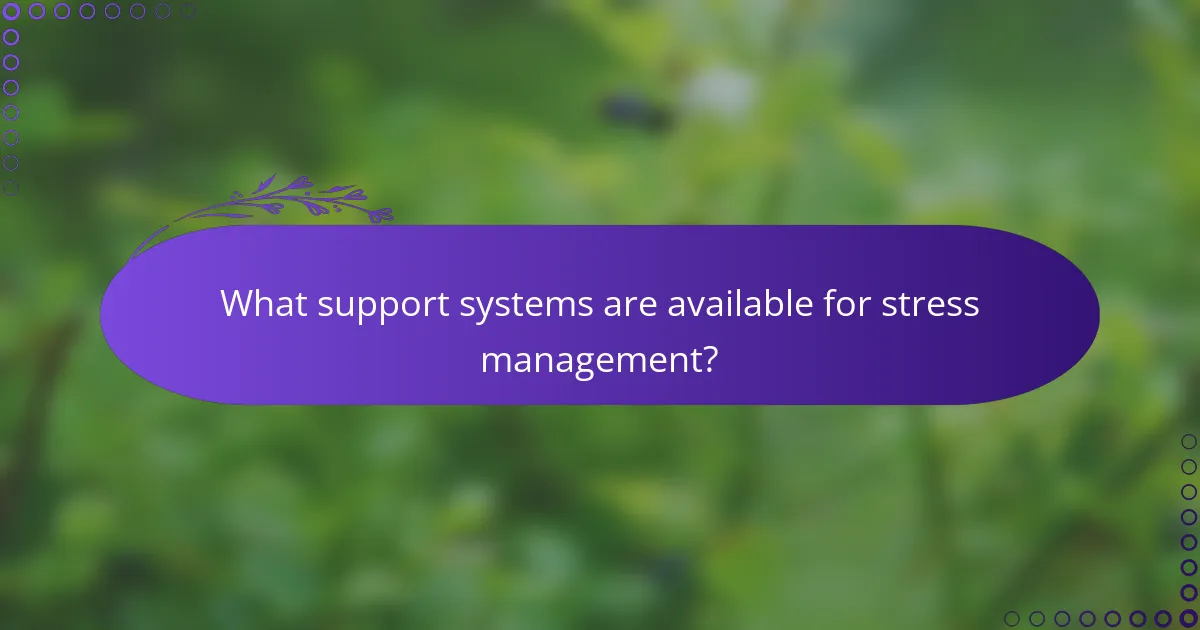Coping with stress during major life changes is essential for maintaining emotional well-being. By recognizing the impact of these transitions and employing strategies such as mindfulness, exercise, and support networks, individuals can enhance their resilience. Additionally, leveraging various support systems, including community groups and online resources, can provide valuable assistance in navigating these challenging times.

How to cope with stress during major life changes?
Coping with stress during major life changes involves recognizing the emotional impact of these transitions and employing effective strategies to manage stress levels. Utilizing techniques such as mindfulness, physical exercise, and building a support network can significantly enhance resilience during these times.
Mindfulness techniques
Mindfulness techniques help individuals stay present and reduce anxiety associated with major life changes. Practices such as meditation, deep breathing, and mindful observation can ground you in the moment, allowing for clearer thinking and emotional regulation.
To start, set aside a few minutes daily for mindfulness exercises. Use apps or online resources to guide your practice, focusing on your breath or surroundings. Aim for at least 10-15 minutes each day to cultivate this habit.
Physical exercise
Engaging in physical exercise is a powerful way to alleviate stress during significant life changes. Regular activity releases endorphins, which can improve mood and reduce feelings of anxiety.
Consider incorporating a mix of aerobic exercises, such as walking, running, or cycling, along with strength training. Aim for at least 150 minutes of moderate aerobic activity each week, as recommended by health authorities. Even short bursts of activity can be beneficial.
Time management strategies
Effective time management strategies can help reduce stress by creating structure during chaotic periods. Prioritizing tasks and setting realistic goals allows you to focus on what truly matters.
Use tools like planners or digital calendars to schedule your day. Break tasks into smaller, manageable steps and allocate specific time slots for each. Avoid overcommitting by learning to say no when necessary, which can help maintain balance.
Seeking professional therapy
Seeking professional therapy can provide invaluable support during major life changes. A therapist can help you process emotions, develop coping strategies, and gain perspective on your situation.
Consider exploring different types of therapy, such as cognitive-behavioral therapy (CBT) or mindfulness-based therapy. Many therapists offer virtual sessions, making it easier to find support that fits your schedule and needs.
Building a support network
Building a support network is essential for coping with stress during significant life changes. Connecting with friends, family, or support groups can provide emotional comfort and practical assistance.
Reach out to those who understand your situation, whether through regular check-ins or joining local support groups. Sharing experiences and feelings can foster a sense of community and lessen the burden of stress.

What individual strategies can help manage stress?
Individual strategies for managing stress include practical techniques that can enhance emotional resilience and improve overall well-being. These approaches focus on personal actions that can be taken to mitigate stress during major life changes.
Journaling for emotional clarity
Journaling serves as a powerful tool for achieving emotional clarity and processing feelings. By writing down thoughts and experiences, individuals can better understand their emotions and identify stress triggers.
To start journaling, set aside a few minutes each day to write freely about your thoughts or specific events that caused stress. Consider using prompts like “What am I grateful for today?” or “What challenges did I face?” to guide your reflections.
Breathing exercises
Breathing exercises can significantly reduce stress by promoting relaxation and enhancing focus. Techniques such as deep breathing or the 4-7-8 method help calm the nervous system and lower anxiety levels.
To practice deep breathing, inhale slowly through your nose for a count of four, hold for seven seconds, and exhale through your mouth for a count of eight. Repeat this cycle several times to experience its calming effects.
Setting realistic goals
Setting realistic goals is essential for managing stress effectively. Achievable objectives help maintain motivation and prevent feelings of overwhelm, especially during significant life transitions.
When setting goals, use the SMART criteria: Specific, Measurable, Achievable, Relevant, and Time-bound. For example, instead of aiming to “get fit,” set a goal to “exercise for 30 minutes three times a week.” This clarity can make it easier to track progress and stay focused.

What support systems are available for stress management?
Various support systems can assist individuals in managing stress effectively. These include community support groups, online therapy platforms, and workplace wellness programs, each offering unique resources and strategies tailored to different needs.
Community support groups
Community support groups provide a safe space for individuals to share their experiences and coping strategies. These groups often focus on specific issues, such as anxiety or life transitions, and can foster a sense of belonging and understanding.
Participants typically meet regularly, which can help build lasting relationships and provide ongoing encouragement. Many groups are free or low-cost, making them accessible to a wide range of individuals.
Online therapy platforms
Online therapy platforms offer flexible access to licensed mental health professionals through video calls, messaging, or phone sessions. This convenience allows individuals to seek help from the comfort of their homes, which can be particularly beneficial for those with busy schedules or mobility issues.
These platforms often provide various pricing options, including subscription models or pay-per-session, making mental health support more affordable. Some popular platforms include BetterHelp and Talkspace, which cater to diverse needs and preferences.
Workplace wellness programs
Workplace wellness programs are designed to promote employee well-being and reduce stress through various initiatives. These may include stress management workshops, access to counseling services, and wellness challenges that encourage healthy habits.
Employers often subsidize these programs, making them a cost-effective way for employees to access support. Engaging in workplace wellness initiatives can enhance job satisfaction and productivity while fostering a healthier work environment.

How do major life changes impact stress levels?
Major life changes can significantly elevate stress levels due to the uncertainty and adjustments they bring. Events such as moving, changing jobs, or experiencing a loss often require individuals to adapt, which can lead to heightened emotional and physical responses.
Emotional responses to change
Emotional responses to major life changes can vary widely, often including feelings of anxiety, sadness, or even excitement. These reactions are normal as individuals process the implications of their new circumstances. It’s essential to acknowledge these feelings rather than suppress them, as doing so can lead to increased stress over time.
Common emotional responses include mood swings, irritability, and difficulty concentrating. Engaging in open conversations with friends or family can help mitigate these feelings, providing a support system that fosters resilience during transitions.
Physical health implications
Major life changes can also manifest physically, impacting overall health. Stress may lead to symptoms such as headaches, fatigue, or digestive issues. It’s crucial to monitor these physical signs, as they can indicate that stress levels are becoming unmanageable.
To manage physical health during these transitions, maintaining a balanced diet, regular exercise, and sufficient sleep is vital. Practicing relaxation techniques, such as deep breathing or yoga, can also help alleviate stress and promote physical well-being, making it easier to navigate life changes effectively.

What are the signs of stress overload?
Signs of stress overload can manifest in various ways, affecting both the body and mind. Recognizing these signs early can help in managing stress effectively and preventing further complications.
Physical symptoms
Physical symptoms of stress overload often include headaches, fatigue, and muscle tension. You may also experience digestive issues, such as stomachaches or changes in appetite. These symptoms can vary in intensity and may worsen if stress continues unaddressed.
It’s important to monitor your body for these signs. For example, if you notice persistent headaches or increased muscle tightness, it may be time to evaluate your stress levels and consider coping strategies.
Emotional indicators
Emotional indicators of stress overload can include feelings of anxiety, irritability, and sadness. You might find yourself becoming easily frustrated or feeling overwhelmed by daily tasks. These emotional responses can significantly impact your overall well-being and relationships.
Pay attention to mood changes and emotional fluctuations. If you notice a pattern of increased anxiety or irritability, it may signal that your stress levels are too high and that you should seek support or implement stress-reduction techniques.

How can one choose the right coping strategy?
Choosing the right coping strategy involves understanding personal needs and preferences, as well as evaluating the effectiveness of various approaches. It requires a thoughtful assessment of what works best for you in managing stress during major life changes.
Assessing personal preferences
Begin by identifying what coping strategies resonate with you. Consider whether you prefer active approaches, like exercise or problem-solving, or passive methods, such as meditation or journaling. Reflect on past experiences to determine which techniques have provided relief in stressful situations.
Creating a list of potential strategies can help clarify your preferences. For example, you might include physical activities, social support, or creative outlets. Rank these options based on your comfort level and past effectiveness to guide your selection.
Evaluating effectiveness
Once you have a list of preferred coping strategies, it’s crucial to assess their effectiveness over time. Monitor how each strategy impacts your stress levels and overall well-being. This can be done through self-reflection or by keeping a journal to track your feelings and responses.
Be open to adjusting your strategies based on your evaluations. If a particular method isn’t yielding positive results, consider trying alternatives or combining different approaches. Regularly revisiting and refining your coping strategies ensures they remain relevant and effective in managing stress.


